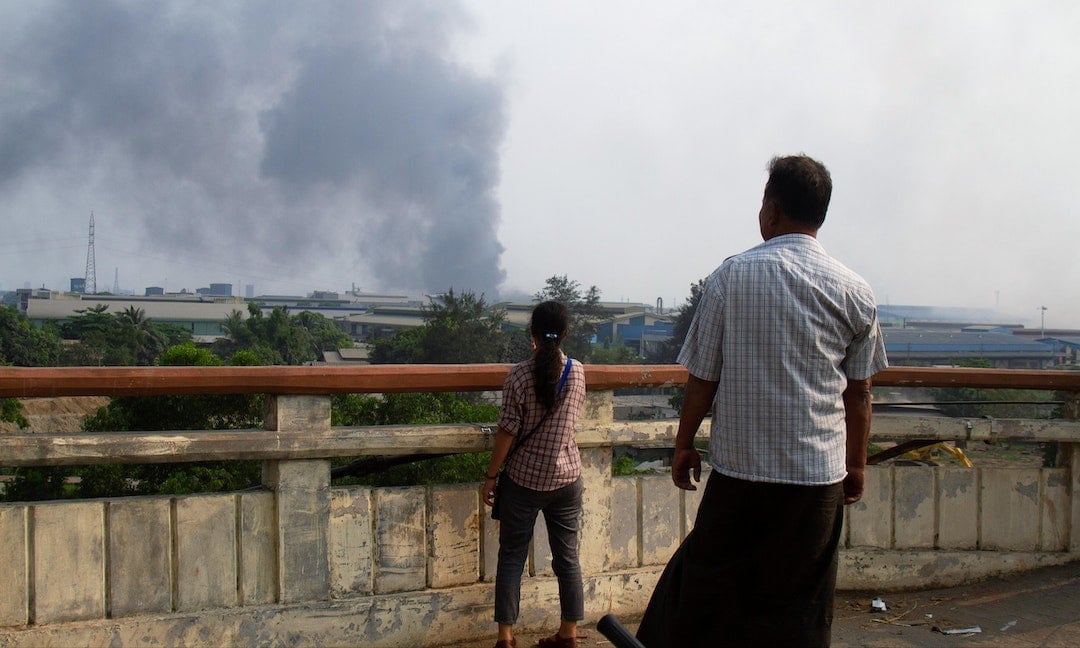
At least 39 demonstrators were reportedly killed in Yangon’s Hlaingthaya area.
Security forces on Sunday killed at least 39 people, 22 of them in a suburb of Yangon, the country’s main city, reports out of Myanmar say, in what would be the bloodiest day of protests against the junta that seized power in a February 1 coup.
According to the Reuters news agency, quoting the Assistance Association for Political Prisoners (AAPP) advocacy group, security forces shot protesters in Yangon’s Hlaingthaya suburb, which is home to Chinese-owned factories. China is seen and supportive of the Myanmar junta.
Authorities have imposed martial law on Hlaingthaya.
Army-run Myawadday television said security forces acted after four garment factories and a fertilizer plant were set ablaze and about 2,000 people had stopped fire engines from reaching them, Reuters said. Plumes of black smoke rose over the area, with some reports saying two of the factories were burned.
Sixteen more protesters were killed in other cities and townships, the AAPP said, as well as one policeman. The previous deadliest day was March 3, when 38 deaths were reported across Myanmar.
Protests are entering their seventh week after the military detained de facto leader Aung Sung Suu Kyi and took power.
Since then, security forces have killed 126 people, the AAPP said, and detained more than 2,150 as of Saturday, with more than 300 released so far.

Photo Credit:AP / TPG Images
Christine Schraner Burgener, the U.N. special envoy of the secretary-general on Myanmar, Sunday strongly condemned the continuing bloodshed.
“The international community, including regional actors, must come together in solidarity with the people of Myanmar and their democratic aspirations,” she said in a statement.
In Insein township recently, protesters laid candles and sang songs to honor those killed. They also chanted to call for the release of Suu Kyi and arrested leaders from her National League for Democracy party.
On Saturday, the acting head of the country’s parallel civilian government, who was appointed by deposed legislators after the military coup, promised a “revolution” to oust the junta.
Mahn Win Khaing, who is in hiding along with most other top NLD officials, addressed the public for the first time, announcing on Facebook that the Committee Representing Pyidaungsu Hluttaw, or CRPH, plans to establish a federal democracy. It was formed by elected members of the ousted parliament on February 5.
He told supporters the CRPH would try to “legislate the required laws so that the people have the right to defend themselves.” He added, “This revolution is the chance we can put our efforts together.”
The military government did not immediately respond to Mahn Win Khaing’s remarks, but it has declared the CRPH illegal.
The junta has called the CRPH a terrorist organization and said anyone involved with it could face treason charges, which are punishable by death.
Amid the continued protests and violence, the United Nations’ human rights investigator on Myanmar has called for the international community to take a united stand against the military junta.
“It is heartbreaking to bear witness to the terror and lawlessness by those who have illegally grabbed power in Myanmar,” which is also known as Burma, Thomas Andrews told the U.N. Human Rights Council Friday.
He added that the international community “must strip away the junta’s sense of impunity.”
A Myanmar official told the council that authorities in the country were using “utmost restraint” toward the protesters.
Andrews called that claim “absurd.”
Military officials have claimed widespread fraud in last November’s general election, which the NLD won in a landslide, as justification for the takeover. The fraud allegations have been denied by Myanmar’s electoral commission.
